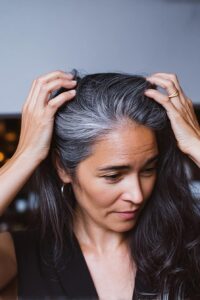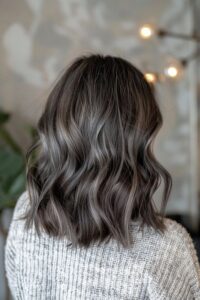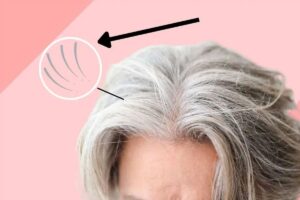Grey Hair in Your 20s or 30s? Here’s How to Treat It Without Chemicals
1. Why Is Your Hair Turning Grey So Early?
- It is becoming more and more typical to experience premature greying in your 20s or early 30s, which may be very upsetting.
- Premature grey hair treatment naturally However, why does it occur? Melanocyte cells found in your hair follicles generate the pigment known as melanin, which determines the color of your hair. Hair turns gray or white when the production of melanin is slowed down or stopped by these cells.
- Although this process is normal as people age, a combination of lifestyle, environmental, and genetic variables might cause an early beginning.
- Genetics is one of the main causes. You are likely to suffer early greying if your parents or ancestors did. But there are other factors besides genetics.
- Chronic stress and other lifestyle choices are important.

- Early greying is also associated with nutritional deficits, specifically in iron, copper, vitamin B12, and folic acid.
- The synthesis of melanin and the general health of hair depend on these nutrients. Restrictive diets, digestive issues, or bad eating habits can all contribute to their shortage.
- Melanocyte activity and hair follicles can be further harmed by environmental pollutants and intense sunshine.
- Smoking is directly associated with early greying and is known to generate free radicals, which greatly increase oxidative stress.
- By harming the scalp and hair structure and hastening pigment loss, strong shampoos, chemical dyes, and heat styling equipment can make the condition worse.
- The first step in treating premature greying is identifying the underlying causes.
2. Top Natural Ingredients That Help Reverse Premature Greying
- Premature greying can be addressed with a number of effective natural therapies.
- These components support general hair vitality, strengthen hair follicles, nourish the scalp, and aid in the natural darkening of hair.
- These alternatives function gradually and gently, in contrast to chemical treatments.

- Indian gooseberry, or amla, is one of the most reliable natural remedies. Amla, which is abundant in vitamin C and antioxidants, promotes natural melanin formation, enhances blood circulation in the scalp, and revitalizes melanocytes. Additionally, it fortifies roots and stops hair loss.
- Curry leaves are an additional potent component. They are rich in calcium, iron, and beta-carotene, among other vital elements. Applying curry leaf paste or oil to the scalp on a regular basis promotes the development of new melanin and stops further graying.
- Bhringraj, also referred to as the “king of herbs” for hair, promotes hair growth, improves pigmentation, and profoundly nourishes the scalp. Because of its healing properties, it is frequently found in Ayurvedic oils and masks.
- Natural dyes like henna and indigo offer a secure substitute for chemical coloring. While indigo, when combined with henna, offers a dark brown to black hue without harming hair strands, henna gives the hair a reddish tone and also conditions it.
- Rich in tannins, black tea adds shine and darkens hair while also acting as a moderate coloring agent. For naturally black or brown hair, it works particularly well as a rinse to preserve the darker tones.
- By regularly using these natural compounds, you may strengthen your hair from the inside out, promote long-term scalp health, and progressively lessen the appearance of grey strands. Their safety, affordability, and compatibility with holistic wellness practices are their greatest advantages.
3. Easy Home Remedies for Grey Hair Control
- Premature greying can be addressed easily and without the use of chemicals with home remedies. These do-it-yourself treatments can nourish your scalp, restore pigment, and enhance the overall condition of your hair with items you can probably find in your kitchen or garden. Patience and constancy are crucial.

- Curry Leaf and Coconut Oil Infusion: Infuse two to three tablespoons of coconut oil with a handful of fresh curry leaves until the leaves are blackened.
- After cooling and straining, massage the oil into your scalp. Beta-carotene and antioxidants, which are abundant in this infusion, encourage the synthesis of melanin and enhance follicle health.
- Amla Hair Mask: Make a paste out of amla powder and a small amount of water or yogurt. After applying it to your hair and scalp for half an hour, rinse with lukewarm water.
- Amla provides luster, increases pigmentation, and fortifies the hair roots.
- Known as the “king of herbs” for hair, bhringraj enhances pigmentation, stimulates hair growth, and provides the scalp with deep nourishment. It is commonly used in Ayurvedic oils and masks due to its therapeutic qualities.
- Henna and indigo are examples of natural dyes that provide a safe alternative to chemical coloring. Henna provides the hair a reddish tone and moisturizes it, while indigo gives it a dark brown to black color without damaging the hair strands.
- Black tea, which is high in tannins, darkens hair, adds gloss, and serves as a mild coloring agent. It is very effective as a rinse for naturally brown or black hair to maintain the darker tones.
4. Nutrition & Lifestyle Tips to Prevent Greying
- Your daily routine and food have a significant impact on the condition of your hair, particularly if you have premature graying.
- Premature grey hair treatment naturally One of the most important but often ignored causes of pigment loss is nutritional deficits. Focus on maintaining a balanced lifestyle and eating a well-rounded diet to naturally combat this.

- Important Nutrients to Add:
- Dairy products, eggs, salmon, and fortified cereals are good sources of vitamin B12. Early greying can be directly caused by a deficit.
- Copper and iron are necessary for the synthesis of melanin and the transportation of oxygen. Consume dark chocolate, cashews, sunflower seeds, lentils, and spinach.
- Zinc and Biotin: Enhance pigment retention and support healthy follicles. accessible in beans, nuts, seeds, and eggs.
- Flax seeds, chia seeds, walnuts, and fatty fish are good sources of omega-3 fatty acids. They lessen irritation and maintain the scalp moisturized.
- Changes in Lifestyle That Are Important:
- Control Stress: Oxidative damage is caused by prolonged stress. To manage stress, engage in yoga, meditation, or mindfulness.
- Get Enough Sleep: To promote hair cell regeneration, aim for 7 to 8 hours of good sleep each night.
- Maintain Hydration: To aid in detoxification and nutrition delivery, consume two to three liters of water each day.
- Steer clear of harsh products: Use gentle, herbal shampoos instead, and refrain from frequent bleaching, heat styling, and hair coloring.
- Protection from the Sun and Pollution: When you go outside, always wear a hat or scarf over your hair, especially in places with high UV or pollution levels. Pollution and the sun harm melanocytes and hasten the onset of graying.
- Engage in Regular Exercise: Exercise increases blood flow, including to the scalp, which supports the growth of pigment cells and hair roots.
- Not only can you avoid premature greying by incorporating these nutritional and lifestyle changes, but you’re also establishing the perfect internal environment for hair that is healthier, shinier, and more vivid.
5. Be Patient, Be Consistent: Natural Care Takes Time
- Natural care necessitates a different mindset in an era of fast results, one that values self-care, patience, and discipline. It takes time to reverse or slow down premature greying naturally. It’s a long-term process that calls for routine constancy and faith in your body’s capacity to recover.
- Results from natural treatments take time to manifest. Shine, strength, and texture may all improve in a few weeks, but consistent application over several months may be necessary to restore pigment. This is due to the fact that melanocyte regeneration and melanin restoration are slow biological processes.

- Establish and follow a realistic routine:
- Twice a week, apply natural oils such as curry leaf oil or amla.
- Every weekend, use DIY remedies or herbal masks.
- Consume a healthy, nutrient-dense diet every day.
- Practice mindfulness, yoga, or journaling to lower stress.
- If results don’t seem to be happening right away, resist the urge to use harsh dyes or treatments. Natural medicines help your body naturally rather than imposing changes on it. Although chemical dyes can provide color instantly, they frequently result in long-term harm.
- See a dermatologist or trichologist if your greying is sudden, uneven, or accompanied by other symptoms including thinning hair, exhaustion, or changes in your skin. Anemia, vitamin B12 deficiency, thyroid imbalance, and other underlying conditions can be detected with the use of blood testing.
- Above all, love yourself as you embark on this adventure. Greying is a normal occurrence and does not indicate your value or attractiveness. By opting for natural treatment, you’re promoting your general health rather than merely taking care of a cosmetic issue. Your hair will appreciate you trusting the procedure.
FAQS
1. Can grey hair be reversed naturally if I’m still in my 20s or 30s?
Yes, in some cases. If the greying is caused by nutritional deficiencies, stress, or lifestyle factors rather than genetics, using natural remedies and improving your diet may help restore pigmentation over time.
2. How long does it take for natural remedies to show results on grey hair?
You may start seeing changes in hair texture and shine within 4–6 weeks. However, visible reduction in grey strands can take 3 to 6 months of consistent use, depending on the cause and severity.
3. Is it safe to use henna and indigo together for coloring grey hair?
Yes. Henna and indigo are 100% natural dyes. When used properly in two steps, they provide a dark, lasting color without damaging the hair like chemical dyes do.
4. Does stress really cause premature greying?
Absolutely. Chronic stress increases oxidative damage, which affects melanocytes—the pigment-producing cells. Managing stress through mindfulness, exercise, and sleep can help slow the greying process.
5. What foods should I eat to prevent grey hair naturally?
Focus on foods rich in Vitamin B12, iron, copper, zinc, omega-3s, and antioxidants. Include eggs, nuts, leafy greens, seeds, lentils, and berries in your daily diet.
6. Can oiling my hair regularly help reduce grey hair?
Yes. Oils infused with herbs like curry leaves, amla, and bhringraj improve blood circulation, nourish follicles, and support pigment restoration. Use 2–3 times a week.
7. Is onion juice effective for treating grey hair?
Yes. Onion juice contains catalase, an enzyme that may help reduce hydrogen peroxide buildup in hair follicles — one of the causes of premature greying.
8. Can too much sun or pollution cause hair to turn grey?
Yes. UV rays and pollutants can damage the scalp and melanocytes, accelerating greying. Cover your hair outdoors and wash off pollutants regularly.
9. Should I avoid commercial shampoos and dyes if I have premature grey hair?
Definitely. Many commercial products contain sulfates, parabens, and harsh chemicals that strip natural oils and damage pigment-producing cells. Opt for mild, herbal alternatives.
10. When should I consult a doctor for grey hair?
If greying is sudden, rapid, or accompanied by fatigue, thinning, or skin changes, consult a dermatologist. You might need blood tests to rule out underlying issues like thyroid imbalance or vitamin deficiencies.
